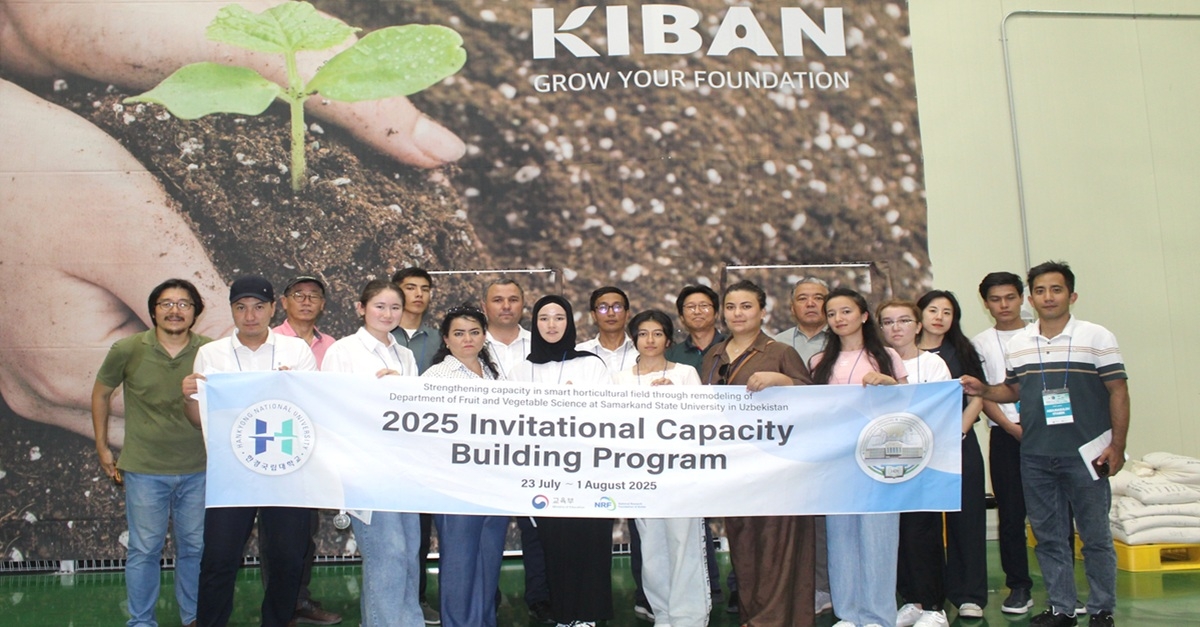Smart technologies - the basis of progress

Toshpulat Rajabov, Director of the Institute of Agrobiotechnologies and Food Security at Samarkand State University, who led a group of Samarkand students and young scientists visiting Hankyong National University to study the smart technologies used in agriculture in South Korea, spoke about the following:
- As a result of climate change, resource depletion, and population growth, the entire agricultural system is facing serious problems. Therefore, the use of new, efficient, and economical technologies is becoming increasingly relevant. Vivid examples of such advanced technologies are the smart greenhouses being built in the agricultural sector. A smart greenhouse, based on digital technologies, allows for the cultivation of high-quality products while reducing resource and labor costs, and also serves to prevent natural and unplanned losses. Simply put, various natural factors have practically no negative impact on the development and yield of plants.
Smart greenhouses have several advantages over traditional installations. In such greenhouses, an extremely favorable environment is created for the development of plants. Modern digital equipment and communication systems continuously monitor the condition of crops and the greenhouse climate. The collected data is transferred to an information technology platform, where it is analyzed using special algorithms. On this basis, the processes of irrigation, fertilization, and lighting are regulated, and agro-engineering measures are coordinated as needed. Continuous monitoring and analysis allows for the timely detection and elimination of the risk of diseases and infections in crops. Smart greenhouses will facilitate the work of farmers, save resources, and increase productivity and efficiency.
Today, South Korea, which is experiencing the consequences of climate change, has become one of the leading countries in the world in the application of advanced scientific and, in particular, digital technologies in agriculture. Great successes have been achieved in the field of combining molecular biology, engineering, and artificial intelligence technologies. In this regard, it would not be an exaggeration to say that the personnel training system has been perfectly established.
Cooperation has been established between Samarkand State University and Hankyong National University of South Korea. This international project aims to train specialists proficient in modern technologies and introduce new technologies into Uzbekistan's agricultural sector.
As a first step in this direction, a research group of Samarkand State University, consisting of students, young scientists, and professors, is visiting South Korea to acquire modern knowledge in the field of agriculture and fruit and vegetable growing using smart technologies.
During the trip, we will visit a number of laboratories, research centers and modern greenhouses of Hankyong National University, get acquainted with the educational process and research work. In particular, we will visit the laboratory of horticultural biotechnology, the "Hansalim" Center for the Analysis of Agricultural Products, agrochemical and soil science laboratories, as well as the university's experimental fields, and thoroughly study the ongoing research. Through lively discussions, we strengthen our knowledge.
Students are determined to study this field in depth and become highly qualified specialists in the future. Within the framework of this 7-year international project, 10 students go to Korea annually to participate in short-term training courses, and then continue their master's and doctoral studies at Hankyong National University...
Scientists of Samarkand State University have established strong cooperation in the field of smart technologies in the agricultural sector with prestigious higher educational institutions not only of South Korea, but also of such developed countries as Italy, Hungary, China, and Japan.
In conclusion, Samarkand State University is carrying out systematic work to establish a modern agricultural education system based on international standards and best practices, thereby preparing a new generation of agricultural specialists for the agricultural sector of our country.

